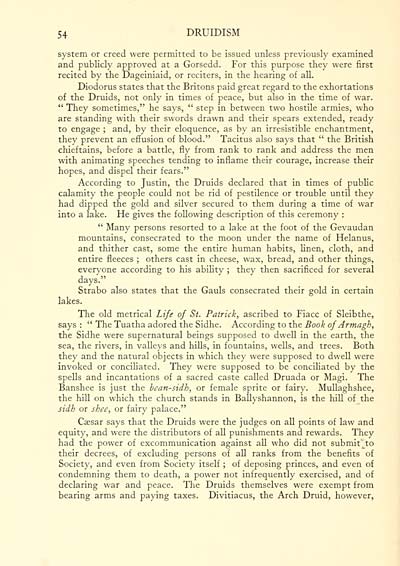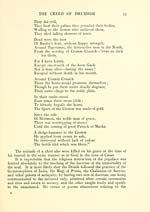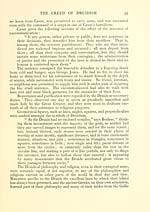Ossian Collection > Druidism
(76)
Download files
Complete book:
Individual page:
Thumbnail gallery: Grid view | List view

54 DRUIDISM
system or creed were permitted to be issued unless previously examined
and publicly approved at a Gorsedd. For this purpose they were first
recited by the Dageiniaid, or reciters, in the hearing of aU.
Diodorus states that the Britons paid great regard to the exhortations
of the Druids, not only in times of peace, but also in the time of war.
" They sometimes," he says, " step in between two hostile armies, who
are standing with their swords drawn and their spears extended, ready
to engage ; and, by their eloquence, as by an irresistible enchantment,
they prevent an effusion of blood." Tacitus also says that " the British
chieftains, before a battle, fly from rank to rank and address the men
with animating speeches tending to inflame their courage, increase their
hopes, and dispel their fears."
According to Justin, the Druids declared that in times of public
calamity the people could not be rid of pestilence or trouble until they
had dipped the gold and silver secured to them during a time of war
into a lake. He gives the following description of this ceremony :
" Many persons resorted to a lake at the foot of the Gevaudan
mountains, consecrated to the moon under the name of Helanus,
and thither cast, some the entire human habits, linen, cloth, and
entire fleeces ; others cast in cheese, wax, bread, and other things,
everyone according to his ability ; they then sacrificed for several
days."
Strabo also states that the Gauls consecrated their gold in certain
lakes.
The old metrical Life of St. Patrick, ascribed to Fiacc of Sleibthe,
says : " The Tuatha adored the Sidhe. According to the Book of Armagh,
the Sidhe were supernatural beings supposed to dwell in the earth, the
sea, the rivers, in valleys and hills, in fountains, wells, and trees. Both
they and the natural objects in which they were supposed to dwell were
invoked or conciliated. They were supposed to be conciliated by the
spells and incantations of a sacred caste called Druada or Magi. The
Banshee is just the bcan-sidh, or female sprite or fairy. Mullaghshee,
the hill on which the church stands in Ballyshannon, is the hiU of the
sidh or shce, or fairy palace."
Caesar says that the Druids were the judges on all points of law and
equity, and were the distributors of all punishments and rewards. They
had the power of excommunication against all who did not submit'^to
their decrees, of excluding persons of all ranks from the benefits of
Society, and even from Society itself ; of deposing princes, and even of
condemning them to death, a power not infrequently exercised, and of
declaring war and peace. The Druids themselves were exempt from
bearing arms and paying taxes. Divitiacus, the Arch Druid, however,
system or creed were permitted to be issued unless previously examined
and publicly approved at a Gorsedd. For this purpose they were first
recited by the Dageiniaid, or reciters, in the hearing of aU.
Diodorus states that the Britons paid great regard to the exhortations
of the Druids, not only in times of peace, but also in the time of war.
" They sometimes," he says, " step in between two hostile armies, who
are standing with their swords drawn and their spears extended, ready
to engage ; and, by their eloquence, as by an irresistible enchantment,
they prevent an effusion of blood." Tacitus also says that " the British
chieftains, before a battle, fly from rank to rank and address the men
with animating speeches tending to inflame their courage, increase their
hopes, and dispel their fears."
According to Justin, the Druids declared that in times of public
calamity the people could not be rid of pestilence or trouble until they
had dipped the gold and silver secured to them during a time of war
into a lake. He gives the following description of this ceremony :
" Many persons resorted to a lake at the foot of the Gevaudan
mountains, consecrated to the moon under the name of Helanus,
and thither cast, some the entire human habits, linen, cloth, and
entire fleeces ; others cast in cheese, wax, bread, and other things,
everyone according to his ability ; they then sacrificed for several
days."
Strabo also states that the Gauls consecrated their gold in certain
lakes.
The old metrical Life of St. Patrick, ascribed to Fiacc of Sleibthe,
says : " The Tuatha adored the Sidhe. According to the Book of Armagh,
the Sidhe were supernatural beings supposed to dwell in the earth, the
sea, the rivers, in valleys and hills, in fountains, wells, and trees. Both
they and the natural objects in which they were supposed to dwell were
invoked or conciliated. They were supposed to be conciliated by the
spells and incantations of a sacred caste called Druada or Magi. The
Banshee is just the bcan-sidh, or female sprite or fairy. Mullaghshee,
the hill on which the church stands in Ballyshannon, is the hiU of the
sidh or shce, or fairy palace."
Caesar says that the Druids were the judges on all points of law and
equity, and were the distributors of all punishments and rewards. They
had the power of excommunication against all who did not submit'^to
their decrees, of excluding persons of all ranks from the benefits of
Society, and even from Society itself ; of deposing princes, and even of
condemning them to death, a power not infrequently exercised, and of
declaring war and peace. The Druids themselves were exempt from
bearing arms and paying taxes. Divitiacus, the Arch Druid, however,
Set display mode to: Large image | Transcription
Images and transcriptions on this page, including medium image downloads, may be used under the Creative Commons Attribution 4.0 International Licence unless otherwise stated. ![]()
| Early Gaelic Book Collections > Ossian Collection > Druidism > (76) |
|---|
| Permanent URL | https://digital.nls.uk/78950388 |
|---|
| Description | Selected books from the Ossian Collection of 327 volumes, originally assembled by J. Norman Methven of Perth. Different editions and translations of James MacPherson's epic poem 'Ossian', some with a map of the 'Kingdom of Connor'. Also secondary material relating to Ossianic poetry and the Ossian controversy. |
|---|
| Description | Selected items from five 'Special and Named Printed Collections'. Includes books in Gaelic and other Celtic languages, works about the Gaels, their languages, literature, culture and history. |
|---|

